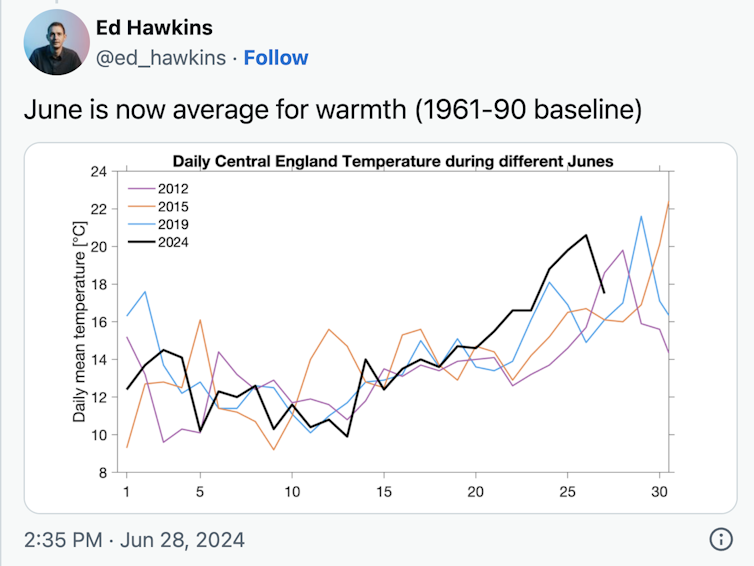
People in the UK love discussing the weather. For the first two weeks of June 2024, the cold, dull conditions were all they could talk about. Major news outlets like the BBC, the Guardian, Daily Mail and Daily Telegraph all carried stories on this theme.
The colder start to June was driven by winds from the north, bringing cool polar air down towards the UK. However, in the second half of the month, a high-pressure system took over and temperatures picked up, reaching 30.3°C on Wednesday 26.
In reality, June 2024 temperatures were pretty typical, about 0.4°C below the long-term average. The month was drier than usual and sunshine hours were slightly above average for the UK as a whole, though significantly below average in parts of Scotland and Northern Ireland.
Do the seasons feel increasingly weird to you? You’re not alone. Climate change is distorting nature’s calendar, causing plants to flower early and animals to emerge at the wrong time.
This article is part of a series, Wild Seasons, on how the seasons are changing – and what they may eventually look like.
Even the first ten days of June in England were only 2.3°C colder than average conditions from 1991 to 2020, according to the Central England Temperature record. The years 2012, 2015 and 2019 all saw similar conditions. So why did 2024 attract so much attention?

A changing climate
Our climate is changing, but how we experience this is through our weather, with more frequent and intense heatwaves, and fewer cold spells. In contrast to 2024, June 2023 was the hottest on record, marked by an unprecedented marine heatwave around the UK and Ireland.
More broadly, Europe has been a hotspot for warming since the 1970s, with temperatures increasing at roughly double the global average and extreme summer temperatures rising even faster.
The hottest five days in the UK since 1910, have all occurred in the past five years.
Such a rapid rate of warming means we have come to normalise extreme heat, while relatively cold or even average conditions feel unusual and thus newsworthy.
Why this matters
When we experience a cold period, it is harder to picture the effects of extreme heat and acting on climate change feels less urgent. Notably, climate change has featured little in the 2024 election campaign. Perhaps that would have been different had the UK been experiencing 40°C, as it did two years ago.
However, while the UK was relatively cool in early June, the US, Mexico and Greece all suffered deadly heatwaves, and more than 1,300 pilgrims died enduring unprecedented heat in Saudi Arabia.
Public normalisation of hotter temperatures may also affect our perception of climate change and thus our willingness to act on it. Ecologists describe a phenomenon called “shifting baseline syndrome”, which is the idea that as the environment degrades, each new generation accepts the degraded situation they experience as normal. This also applies to climate change, as people forget or have no experience of the climate in the not-too-distant past.
However, the changing climate, with more frequent and intense heatwaves, has severe effects even in the relatively mild UK. While heatwaves are often depicted with “fun in the sun” pictures, extreme heat affects the most vulnerable in society. The UK government calculates that around 3000 extra deaths occurred in summer 2022 due to heatwaves.
Heat also affects public services by damaging roads, disrupting the rail network and putting a strain on fire departments through wildfires.
While we continue to burn fossil fuels, releasing carbon dioxide into the atmosphere, the planet will continue to warm. Consequently, recent warm summers such as 2022 may feel average or even cool by the middle of this century. To avoid the normalisation of extreme and potentially life-threatening weather events, scientists have a responsibility to inform the public about how our climate is changing.
Matthew Patterson receives funding from the Royal Society.
This article was originally published on The Conversation. Read the original article.







